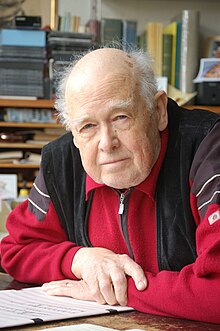Das Märchen von der schönen Lilie
| Das Märchen von der schönen Lilie | |
|---|---|
| Opera by Giselher Klebe | |
 The composer in 2008 | |
| Translation | The Fairy Tale of the Beautiful Lily |
| Librettist | Lore Klebe |
| Language | German |
| Based on | The Green Snake and the Beautiful Lily by Johann Wolfgang von Goethe |
| Premiere | 15 May 1969 |
Das Märchen von der schönen Lilie (The Fairy Tale of the Beautiful Lily), Op. 55, is an opera in two acts by Giselher Klebe, with a libretto by Lore Klebe, based on Goethe's fairy tale Das Märchen. On a commission by the SWR for the Schwetzingen Festival, it was premiered on 15 May 1969 at the Schlosstheater Schwetzingen, staged by Oscar Fritz Schuh and conducted by Hans Zender. The opera was published by Bärenreiter.
History[edit]
Klebe composed the opera on a commission of the broadcaster Südwestrundfunk for the opening of the Schwetzingen Festival.[1] He based the opera on classical literature, as also in some of his earlier operas such as Die Räuber after Schiller (1957), Die tödlichen Wünsche after Balzac (1959) and Alkmene after Kleist (1961).[2] His wife, Lore Klebe, wrote the libretto based on the fairy tale Das Märchen, part of the novella Unterhaltungen deutscher Ausgewanderten by Johann Wolfgang von Goethe.[3]

Das Märchen von der schönen Lilie premiered on 15 May 1969 at the Schlosstheater Schwetzingen.[2] The night before, Marianne Hoppe recited Goethe's Märchen.[4] The opera production of the Deutsche Oper am Rhein was directed by Oscar Fritz Schuh on a stage designed by Heinrich Wendel, and conducted by Hans Zender.[2] The opera was published by Bärenreiter.[3] The first performance in the German Democratic Republic was staged in Weimar in 1988, where Goethe had written his text.[5]
Theme[edit]
Goethe titled his art fairy tale like the genre, Märchen, indicating that it was a typical example of the genre in symbolic purity (in symbolischer Reinheit). He characterised it as at the same time significant and without specific meaning ("zugleich bedeutend and deutungslos"). Hugo von Hofmannsthal described it as an uninterpretable inner music of beautiful images and life contexts ("eine undeutbare innere Musik aus schönen Bildern und Lebensbezügen"), in other words: an abstract art.[6]
Roles[edit]
| Role | Voice type | Premiere cast, 15 May 1969 Conductor: Hans Zender[7][8] |
|---|---|---|
| Schlange | soprano | Rachel Yakar |
| Frau | soprano | Judith Beckmann |
| 1st Girl | soprano | Rachel Mathes |
| 2nd Girl | soprano | Brigitte Dürrler |
| Schöne Lilie | mezzo-soprano | Rose Marie Freni |
| 3rd Girl | contralto | |
| The Youth | tenor | |
| Man with the Lamp | baritone | Kurt Gester |
| Ferry Man | baritone | Leif Roar |
| Giant | bass | Helmut Fehn |
| Golden King | bass | Eike Wilm Schulte |
| Silver King | bass | Peter-Christoph Runge |
| Iron King | bass | |
| Mixed King | bass |
Music[edit]
Klebe's music is scored for soloists and a chamber orchestra of 30 players, including alto saxophone, harp and two pianos. Instruments in the low register dominate: there are a basset clarinet and three bassoons but no violins. Klebe used leitmotifs, chord motifs, twelve-tone tone rows and chromaticism.[1][2] The music has been described as boldly turning backwards in music history and full of esoteric, beautiful sound.[2]
References[edit]
- ^ a b "Wirklich alles". Der Spiegel (in German). 19 May 1969. Retrieved 9 May 2019.
- ^ a b c d e Herbort, Heinz Josef (23 May 1969). "Es ist an der Zeit / Klebes Märchen von der schönen Lilie in Schwetzingen". Die Zeit (in German). Retrieved 12 May 2019.
- ^ a b Klebe, Giselher. Biografie & Werkverzeichnis (in German). Giselher Klebe. Retrieved 1 August 2017.
- ^ "14.05.1969 bis 09.06.1969 / Schwetzinger Festspiele". ARD (in German). 1969. Retrieved 9 May 2019.
- ^ Thiel, Klaus (July 1988). "Wirklich alles". Theater der Zeit (in German). Retrieved 9 May 2019.
- ^ Borchmeyer, Dieter (1998). Weimarer Klassik: Portrait einer Epoche (in German). Beltz/Athenäum. pp. 249–252. ISBN 978-3-40-732124-4.
- ^ Casaglia, Gherardo (2005). "Das Märchen von der schönen Lilie, premiere cast". L'Almanacco di Gherardo Casaglia (in Italian).
- ^ Griffel, Margaret Ross (2018). Operas in German: A Dictionary. Rowman & Littlefield. p. 315. ISBN 9781442247970.
External links[edit]
- Das Märchen von der schönen Lilie in Opening Night! Opera & Oratorio Premieres, stanford.edu
- Das Märchen von der schönen Lilie, Operone
